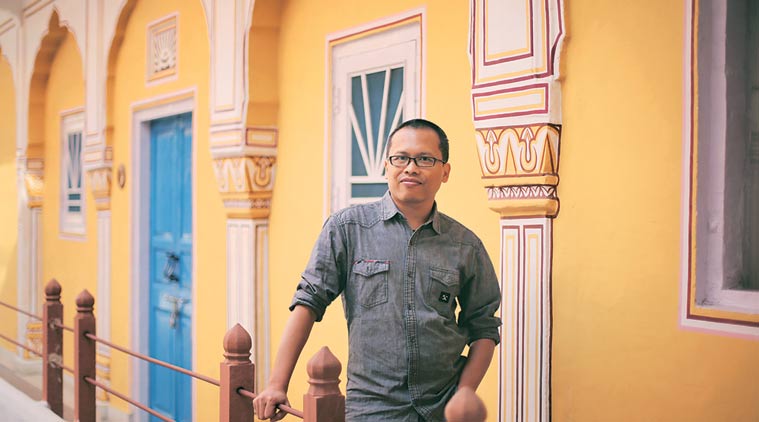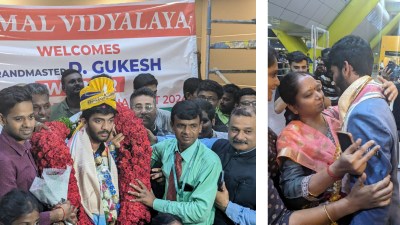- India
- International
Reading Suharto, Quran Mahabharata and Ramayana
"Almost all the characters in my novels and their stories basically come from the Mahabharata and the Ramayana."
 Eka Kurniawan
Eka Kurniawan
In India to attend the Zee Jaipur Literature Festival, Eka Kurniawan, 41, Indonesia’s newest literary sensation, speaks on Beauty is a Wound, his memories of the Suharto years and the thin line between god and ghosts. Excerpts:
How have you changed as a person and as a writer since the time Beauty is a Wound first came out in 2002 in Indonesia?
I am just a little busier but I am still the same person. I still do many things that I used to do – drive my daughter to school in the morning, sleep a lot, drink coffee and read books in a deserted coffee shop where nobody knows me.
When I first read Beauty is a Wound, it struck me as very visual and lyrical, despite the violence it portrayed. It made me curious to find out if you are interested in music and if you think visually?
When I was a teenager, before I decided to become a writer, I desired to be a musician — at least, to form a band. I abandoned that idea after realising that I have no gifts at all as a musician, although I still listen to many kinds of music genres. I like pop music from the ’90s and the ’60s. Nowadays, if I am too lazy to write, I sketch or paint. I do illustrations and cover designs for some of my books in Indonesian editions.

Tell us a bit about your childhood. Where in Indonesia did you grow up? What sort of stories did you listen to?
I was born in a village, a remote place in west Java where all my grandparents lived, around seven hours drive from Jakarta. When I attended primary school, I lived with my parents in a small coastal town, Pangandaran. It is really just a small town, but luckily, it is a tourist spot too. While my father taught me English (he was an English teacher), I learnt a lot of the language from tourists I met in Pangandaran. These village and small towns as well as their inhabitants are very important for my stories. Many of the episodes in the novel are basically the stories I heard from them.
Are they the same stories that you tell your daughter?
Many of them, but usually I create my own stories for my daughter. My daughter was born and is growing up in a very different environment. She likes to watch anime while I grew up with wayang performances of the Mahabharata.
The Ramayana and the Mahabharata are rooted in folklore in both India and Indonesia. A lot of your characters are named after characters from the epics. How did they influence your writing?
They influence me, I think, more than anything else. Almost all the characters in my novels and their stories basically come from the Mahabharata and the Ramayana. The style used by my narrators came from the wayang (puppet) performance, the way they tell these Mahabharata or Ramayana epics. And don’t forget about the dramatic, tragic and even grotesque elements that you can find in my novels as well as in wayang performances.
Was puppetry a big part of your childhood?
At least two puppetry traditions shaped my childhood. First, the wayang golek (wood puppet), that is usually performed in west Java. Second, the wayang kulit (shadow puppet), performed around central Java. Pangandaran is a town exactly on the border of west and central Java, with mixed Sundanese and Javanese cultures. In this town, I could watch both.
There’s so much violence, in particular sexual violence, in the book. Were you hesitant to look at Indonesia’s history through such brutality, or were you certain this was the way to tell the story?
The violence, like other elements in the novel, came to be as it was. I just wanted to write the book in a direct manner. The book was written just two years after the fall of Suharto’s dictatorship (in 1998). It was the time when almost all writers wanted to be bolder, not only about politics and social criticism but, of course, about sexuality and violence.
What are your memories of the Suharto years?
I wasn’t born when he came to power (March 1967). My earliest memory is from my childhood, when I was six or seven years old. It was the beginning of the ’80s. We lived in a neighbourhood where gangsters hid, where truck drivers rested and, sometimes, prostitutes came and went. I heard rumours about some gangster who had died in the gutter, having been shot mysteriously. As a kid, I didn’t understand what really happened. My family moved from that neighboorhood to another small town, and many years later, my mother told me that we moved because my father was afraid I would be influenced by that neighbourhood. That was my earliest memory about Suharto, about the violence of his power.
In a piece in the New York Times, you talk of your ambiguous relationship with religion and how your father, an imam, and your mother both encouraged you to pray. How did you come to be different?
I am not sure how my own religious beliefs or my view about religion was shaped gradually. My father taught us (me and my siblings) to read the Quran, of course, and took us to the mosque, at least every Friday noon. But he always sent us to state-run schools; allowed me to study Western philosophy at university when I wanted to, and never sent us to the religious-based schools. While I was always indifferent about practising religion, my mother, of course, still persuades me to do that.
Both Beauty is a Wound and Man Tiger have many ghosts in them. Do you believe in ghosts?
I am always open to possibilities. I have never met ghosts and I can’t prove their existence or non-existence. But in this world, there are a lot of things we don’t know and don’t understand. The most important thing about ghosts for me is that as long as people talk about them, they are relevant to our lives. Maybe ghosts are a kind of mirror for our fears, or maybe, our hopes?
A bit like God, then, would you say?
God and ghost? In many ways, they are similar, right? Except that people tend to believe that God created the world, including ghosts. We have funny words in Indonesia: ‘Tuhan’ for God and ‘Hantu’ for ghost. If you recite Tuhan continuously, in the end, you can hear ‘Hantu’.
How did you come to be interested in writing? Did you always want to be an author?
No, that came later. I liked to read novels and stories from my childhood, but I never wanted to be a writer. I preferred to be a band musician or a painter when I was a teenager. That changed in the late ’90s, especially after I read Hunger by Knut Hamsun. To be honest, I don’t really understand what happened after I read that novel, but instantly, I just wanted to be a writer, and started to write seriously.
How did your family react?
They knew that I had always loved to read, so it didn’t surprise them. But, as I am the only writer in the family, their reaction wasn’t very positive. My parents used to worry about how I would make a living, although they never expressed any kind of objection. In my early days as a writer, my father would sometimes call just to ask, “Do you have money for your meals? For your room?” My mother never reads anything I write, but as time flies, she is proud to see how I have survived until this day.
You write in Indonesian, a language that was breathed into life in 1945. Was it the language that you grew up with and spoke at home and with your friends?
I speak Sundanese with my mother, my brothers and sisters. I speak Indonesian at home now, as my daughter speaks Indonesian. With my friends, it depends. Sometimes, I speak Javanese with some of my Javanese friends, usually friends from my childhood.
How do you react to comparisons with Pramoedya Ananta Toer? How did his work impact you?
It is inevitable. Pramoedya is a great Indonesian novelist. Whoever comes to prominence will be compared with him. I read his works relatively late, when I was a student at the university, as his works were banned for a long time. I had just decided to become a writer, but was still trying to find out what I should write about. And then I read some of his books and it looked like a door opened wide for me. I saw an Indonesian landscape — its land and people — in his works. Those are what I wanted to write about too.
Did you envision Beauty is a Wound as the ‘Great Indonesian Novel’?
In the Indonesian literary tradition, almost nobody is obsessed with that and there is no such term. My intention was to write about Indonesian history. It wouldn’t be a kind of historical novel, but a novel about history. While the novel tells the landscape of the Indonesian land, people and history, at the same time, it poses a big question about history itself. What is history?
What are you working on now?
A movie script based on my third novel, Vengeance is Mine, All Others Pay Cash. The novel will be published in English (in US, UK, Australia as well as in India) this year. Maybe in July or August.
More Lifestyle
Apr 25: Latest News
- 01
- 02
- 03
- 04
- 05




































